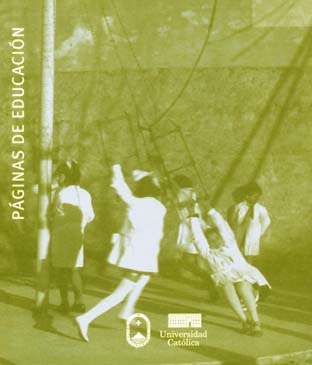Motives and expectations of the demand for pedagogical support in secondary education
DOI:
https://doi.org/10.22235/pe.v10i2.1423Keywords:
socio-cultural approach, learning, learning contexts, educational support, secondary educationAbstract
With the purpose of knowing the demands that happen outside of educational institutions, this article approaches the pedagogical support as an educational context that emerges from the intersection between the formal and non-formal contexts of learning, and that produces a relationship of reinforcement and collaboration. This study aims to recognize the reasons why families ask for pedagogical support in the first year of secondary education. To this end, fifteen in-depth interviews were conducted with the mothers of students who attended support classes, the teachers who provided the service and different educational agents of a school located in a town in the south of Cordoba, Argentina. It was found that the reasons for which the relatives demand the contexts of pedagogical support are crossed by issues of academic, socio-familiar and affective nature. This study allows to think of support classes as an educational context that strengthens learning opportunities.
Downloads
References
Bray, M. (1999). The Shadow Education System: Private Tutorig and Its Implications for Planners. París, Francia: UNESCO - International Institute for Educational Planning.
Bray, M., Adamson, B., y Mason, M. (2010). Educación comparada: enfoques y métodos. Buenos Aires, Argentina: Granica.
Buchmann, C. (2002). Getting ahead in Kenya: Social capital, shadow education, and achievement. En B. Fuller, y E. Hannum (Eds.), Schooling and Social Capital in Diverse Cultures (pp. 133-159). Ámsterdam, Holanda: JAI Press.
Manavella, A. M. (2016). La demanda familiar de contextos de aprendizaje extraescolares en Educación Secundaria (Tesis de Grado). Universidad Nacional de Villa María, Córdoba, Argentina.
Martín, R. (2014). Contextos de aprendizaje. Formales, no formales e informales. Ikastorratza, 12. Recuperado de http://www.ehu.eus/ikastorratza/12_alea/contextos.pdf
Martín, R., Ciochetto, E., y Vaja, A. (2016, noviembre). La diversidad de los contextos de aprendizaje en el desarrollo del rol del psicopedagogo. Trabajo presentado en la Jornada homenaje a Lev Vigostky, a 120 años de su nacimiento, Córdoba, Argentina.
Moraga, V. (2011). Somos mucho más que dos. Revista Rumbos, 28, 22-28.
Rinaudo, M. C. (2014). Estudios sobre los contextos de aprendizaje. Arenas y fronteras. En P. Paoloni, M. C. Rinaudo, y A. González Fernández (Comps.), Cuestiones en Psicología Educacional: cuestiones teóricas, metodológicas y estudios de campo (pp. 163-206). Tenerife, España: Sociedad Latina de Comunicación Social. Recuperado de http://issuu.com/revistalatinadecomunicacion/docs/cde01
Runte-Geidel, A. (2013). La incidencia de las clases particulares en España a través de los datos de PISA. Revista Española de Educación Comparada, 21, 249-282.
Runte-Geidel, A. (2015). La educación a la sombra en países del Sur de Europa y sus implicaciones sobre la Equidad. Revista Española de Educación Comparada, 25, 167-182.
Smitter, Y. (2006). Hacia una perspectiva sistémica de la educación no formal. Laurus, Revista de Educación, 12(22), 241-256.
Stake, J. (1998). Investigación con estudios de caso. Madrid, España: Morata.
Trilla, J., Gros, B., López, F., y Martín, M. J. (2003). La educación fuera de la escuela: ámbitos no formales y educación social. Barcelona, España: Ariel Edición.
Ventura, A., Neto-Mendes, A., y Costa, J. A. (2006). El fenómeno del apoyo al aprendizaje fuera de la escuela a través de un análisis comparado. Revista de currículum y formación del profesorado, 10(2), 1-19.
Wood, D., Bruner, J. S. y Ross, G. (1976). The role of tutoring in problem solving. Journal of Child Psychology and Psychiatry, 17, 89-100.















